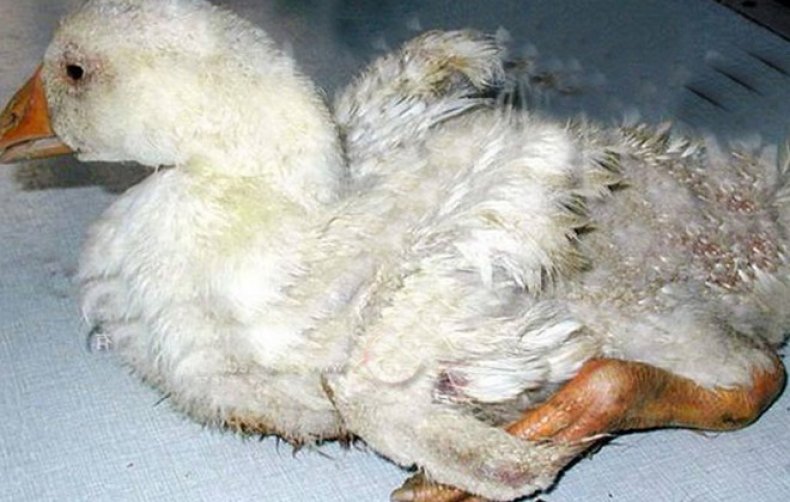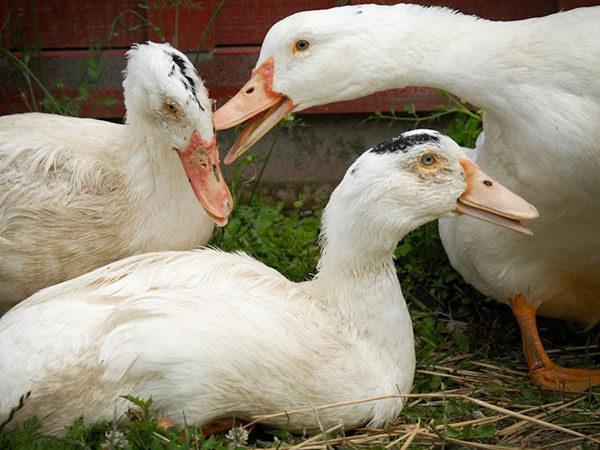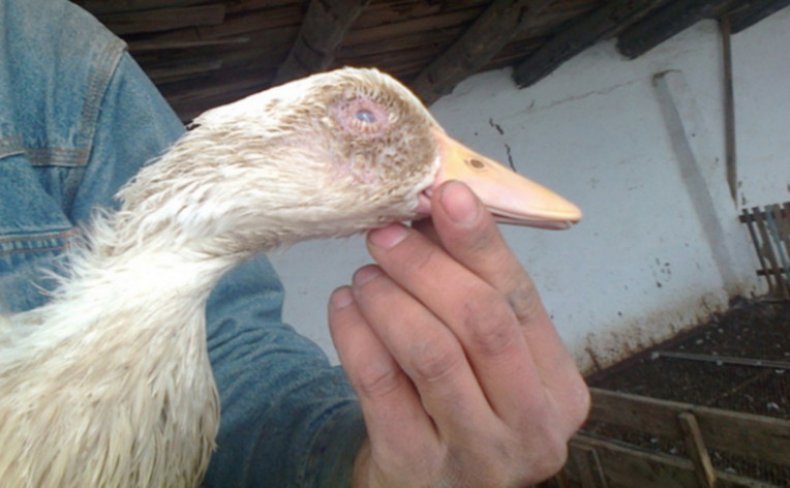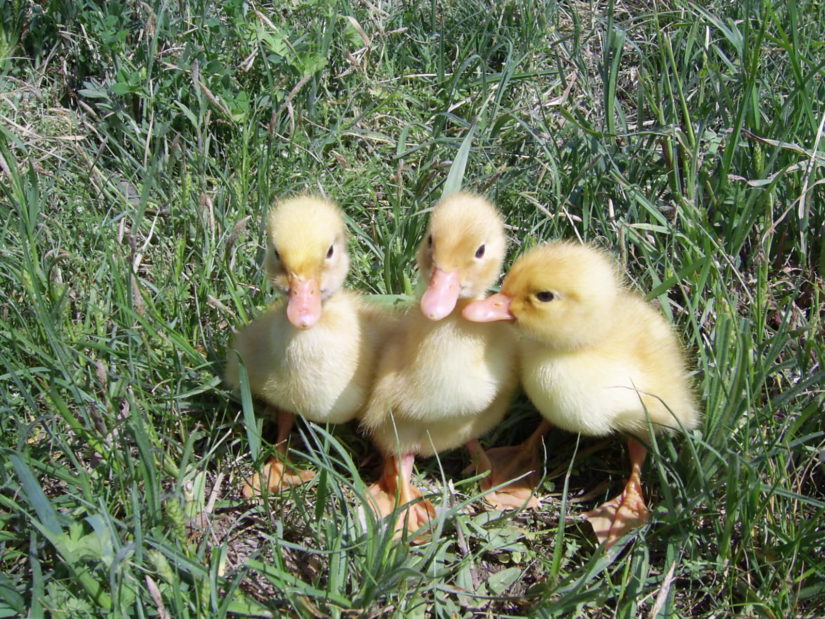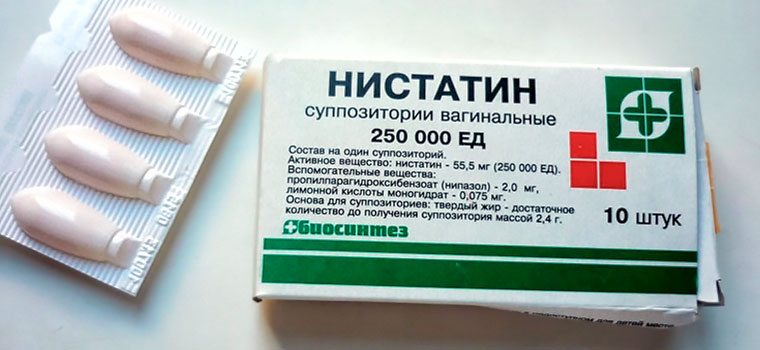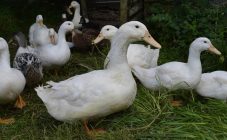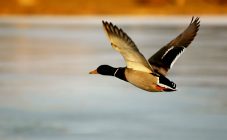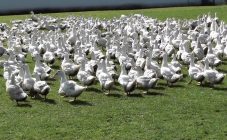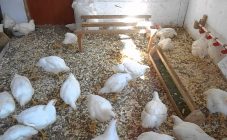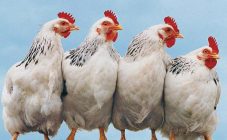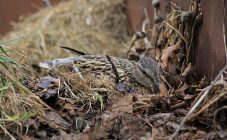Content:
Young poultry are often susceptible to various diseases. This is a cause for concern for the owner, who puts all his energy into growing them. One of the most common diseases in ducks is falling on their feet. You can use this article to understand why the duck does not stand up, what to do with it in this case and how to prevent such problems.
Why birds sit on their feet and die
More than one household, poultry farm or farm is not 100% immune from infectious infection and parasitic pests. Ducks are most susceptible to them. Their condition worsens with small deviations in the content, non-observance of nutritional rules and a monotonous diet. A large concentration of birds and insufficient walking, the absence of reservoirs - all this can cause pain.
The first and main symptom of soreness in ducks is death on the legs. Before starting treatment, it is important to understand why ducks are deprived of their legs. Any delay in treatment will result in the death of the birds. The reasons why the duck cannot move include:
- Parasitic insects that suck blood - this explains why ducks fall to their feet and die in the shortest possible time. Most often, fleas, lice, lice and feather eaters provoke diseases. Trying to cleanse them on their own, the chicks deliberately fall on their paws. The common habitats of the parasite are the abdomen and the underwing area;
- Infectious pathogens - usually accompanied by loss of the feather part, purulent formations. Common avian diseases are coccidiosis, hepatitis, tuberculosis, runny nose, and aspergillosis. All these diseases pose a danger not only to other household residents, but also to humans;
- Feeding chicks with coarse fodder on an ongoing basis contributes to the development of catarrh - clogging of the crop;
- The presence of drafts - leads to a decrease in the protective functions of the bird's body, which increases vulnerability to many diseases.
Regardless of the reason, if the ducks sit on their feet and die, the first thing to do is to isolate sick individuals from the flock. It is also necessary to use a disinfectant in areas where sick birds lived.
Aspergillosis
The disease refers to infections provoked by a fungus. Mostly considered a disease of the respiratory system. A damp, poorly ventilated room with a large concentration of poultry is considered ideal for the reproduction of the fungus. The fungus actively reproduces in wet feed, straw bedding and droppings.
Tuberculosis
A disease that is dangerous not only for animals, but also for humans. In the main part, it is able to proceed without symptoms, the incubation time of development is no more than a year. Identification of the disease in the early stages is complicated by the absence of an acute form.
When infected, diseased ducks cannot be treated. The flock can only be helped to survive by slaughtering and disposing of diseased individuals. In any case, all actions are carried out only under the guidance of a veterinarian.
Hepatitis
The disease is typical for chicks not older than 2 weeks. When an infection appears, 100% of the infected individuals die in the first week of life. When infected in the second week, only a few chicks remain to live.Since this is an infectious disease of newborn chicks, it is not scary for adult birds. But at the same time, it is the adult ducks that carry the hepatitis pathogen.
Most often, young ducklings get the disease through droppings and mucous secretions. Food and drink can also be sources of contamination. The resistance of the infection to external factors makes it possible to preserve it on cleaning items in poultry houses and in litters for 6 months.
Avitaminosis as the cause of the death of ducks on the legs
Lack of vitamins and minerals in the young body of chicks can cause problems with the limbs. A duckling can suffer from curvatures, swelling and even paralysis. As a result, chicks begin to fall off their feet while still small.
Avitaminosis is not a danger to the flock and owners, in contrast to infectious diseases. To a greater extent, the problem is associated with improperly planned nutrition and a lack of microelements, with a deficiency of which immunity begins to decrease. You should understand why ducks sit on their feet and how to treat them in case of vitamin deficiency.
First of all, the paws of a duck weaken with a deficiency of vitamins of groups B, E and D. Unlike other reasons why the paws may refuse, this concern is eliminated by adding a special fortified feed to the diet. It all depends on which vitamin is missing.
When the ducks fall to their feet, the cause and treatment depend on the symptoms that appear. With an insufficient amount of vitamin D, the chicks begin to drag their legs with them, curvature and further inability to walk become noticeable. At the same time, the duckling stops growing, does not gain weight; adult birds are characterized by laying eggs with a weak and thin shell. Chicks become rickets, and adult ducks cannot rise at all.
An insufficient amount of vitamin E in veterinary medicine can also be called feed encephalomalacia. The disease is accompanied by lethargy of ducks, significant lethargy. There are noticeable problems with the coordination of animals, and convulsions are increasingly manifested. As a result, the bird may fall to its feet.
A deviation from the normal level of vitamin B2 index causes disruptions in metabolic processes, oxidation and processing of proteins are disrupted. A sharp jump in this vitamin provokes a stop in development, the young bird stops gaining weight fully. As a result, anemia develops, anemia manifests itself. Avitaminosis begins to deplete poultry due to severe curvature of the limbs. All that remains for them is to sit on their paws, since they can no longer control their own movement.
The assimilation of proteins depends directly on vitamin B12. Its lack in the body of birds leads to a decrease in appetite and a complete refusal to eat. At the first stage of vitamin deficiency, a spasm of the limbs appears, poultry begin to sit on their feet, stop feeling them.
Bird feeding
To prevent the ducks from getting sick, it is necessary to correctly approach the selection of their food. A variety of food groups should be present in the daily diet that will help fill the lack of essential nutrients.
If a domestic duck is limping in one leg, the first thing to do is to review the bird's diet. Most often, the paw is a part of the body that indicates vitamin deficiency. In this case, the ducks need to start providing natural sources of vitamins: fresh grass, homemade vegetables. There are also special vitamin complexes for poultry, the most balanced.
Little ducklings need vitamin A, which is found in carrots. To maintain a normal level of vitamin in the body, chicks are fed grated carrots mixed with healthy fish oil.Also, small chicks have fragile bones, calcium is needed to strengthen and grow. You can fill the deficit with products containing this element in large quantities.
Bone and fishmeal are natural sources of vitamin D, which is essential for young animals. Crushed shells mixed with regular feed are a popular recipe for helping to raise the level of calcium in the bird's body.
It is possible to enrich the body with the necessary selenium through diluting the usual feeding with vitamin and mineral complexes. It is useful to add dairy products, yeast, bran, carrots and potatoes to the diet to raise the level of vitamin E. To supplement the body with B2 vitamins, you can mix grain mixtures. Animal products (especially dairy products) contain a huge amount of vitamin B12 necessary for ducks.
To prevent sickness in poultry, their daily diet should include:
- carbohydrates - various groups of grain crops, boiled potatoes, beets;
- animal based protein - low fat cottage cheese, whey, fish and meat waste, incl. bone flour;
- vegetable protein - sunflower, soybean, flaxseed cake;
- natural vitamin products - grass, nettle, foliage from carrots and beets, various greens;
- dry compound feed containing everything necessary for pets of different ages;
- Crushed shell, eggshell, chalk.
Parasite control
We must not forget that diseases provoked by infectious pathogens are dangerous not only for a sick duck, but also for all inhabitants of the poultry yard. If the source of infection is not identified in time, most of the birds die. Infections and viruses are especially dangerous for young livestock.
Most often, ducklings are infected in the egg. Chicks, catching aspergillosis, begin to die. The first symptoms of infection are tearing and the formation of a film on the eyes. Further, the ducks can begin to cough, severe ventricular upset and convulsions appear. The last stage in the progression of the disease is the death of ducklings on the legs. At the same time, a constantly open beak is noticed through which the chicks breathe, and wheezing is heard.
Observing the first symptoms, do not expect deterioration. Here it is necessary to use the antifungal agent Nystatin. It is mixed into food and water. A weak mixture of copper sulfate is also used. Sick birds must be isolated.
With tuberculosis, birds practically do not budge, they stop laying eggs. There is a strong deterioration in appetite, weight loss, diarrhea. Tumors appear on the limbs, the ducks begin to limp and completely cease to rise to their feet. To prevent the spread of tuberculosis, it is recommended:
- Isolate a sick duck from the rest;
- Grow juveniles separately from adult units;
- Disinfect poultry areas. Conduct mandatory disinfection at least 2 times a year;
- Constantly process equipment for cleaning poultry houses with high temperatures;
- Dispose of poultry droppings;
- Adhere to the rules for storing animal feed.
With hepatitis, the following symptoms can be observed:
- Teary eyes, redness;
- The mucous membrane of the eye becomes bluish;
- The breathing process is noticeably difficult;
- Birds lose coordination, seizures appear. The result is a fall on the limbs;
- With further deceleration, you can see the ducklings fall on their sides and begin to throw their heads back.
In adults carrying the virus, there is a temporary loss of appetite, general lethargy, and slight difficulty in breathing. Birds can also sit on their feet. Sick birds cannot be treated. There are only preventive measures:
- it is proposed to vaccinate the born chicks;
- keep eggs and adults separately;
- vaccinate healthy individuals with hepatitis serum;
- periodic disinfection of the premises where ducks live.
Prevention
In order not to have to think about how to treat sick ducks, it is worth purchasing birds that are immune to most of the diseases. These species include the Mulard hybrid duck. Also, do not neglect the tips and tricks for keeping birds.
First of all, a properly formulated diet for individuals from birth can prevent the development of many problems. Providing a warm, comfortable room with a small population will prevent parasites from multiplying and will prevent pain in the same way. No less important is the constant cleaning of the premises from the droppings in which parasites multiply so quickly.
Soldering chicks with vitamin complexes is considered a good preventive measure. Already from the first days after birth, they must be fed with compound feeds for the corresponding age category, enriched with the necessary microelements. Starting from the 3rd day of life, you can gradually add fresh grass to the diet of babies.
